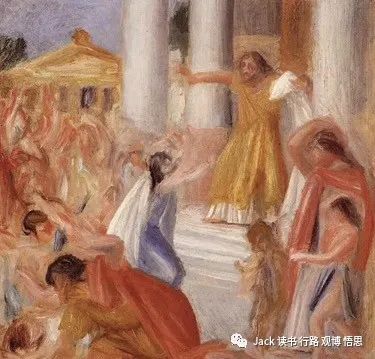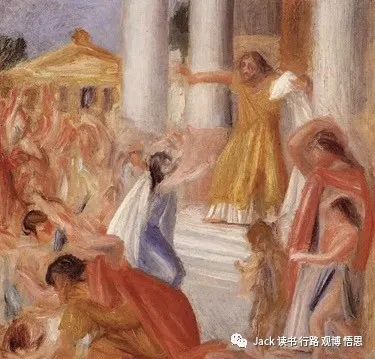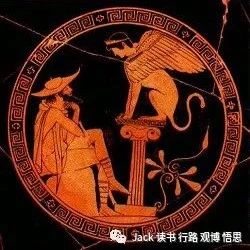Read History With Jack 39 - Fate and Human Will
In ancient Greek tragedy, one of the most profound and central messages is that although we cannot eventually escape the whims of fate, that does not mean that we should stop struggling against it and just admit life as it is. The very fact that we cannot escape fate reflects the value and power of the free will of human nature. Only by trying to break free can people explore the limits of their freedom. This central idea, presented in renowned tragedies such as Oedipus Rex, can still be manifested in the lives of modern-day people, and still holds significance over all of us today.

(Oedipus Rex stabbing his eyes blind)
For an individual, the notion to no. Yet history has proved, that the act of endeavoring to rebel against fate itself can bring growth and change to an individual. For example, King Oedipus makes daring attempts to escape his fate. Even though the attempts are not successful, they help him eventually make his turn from a self-righteous ruler into a true philosopher. Without trying to initially refute the Oracle of Delphi, he would not have truly grown and developed. For us today, this story still is endearing and valuable. Virtually all people are born with certain defects, be it physically or mentally. This fact does not mean that we should do nothing to make a difference. Instead, in the action of trying to make a difference, we would have learned and changed in many positive ways. For example, the mathematician John Nash suffered from schizophrenia from an early age. This symptom means that one must live with hallucinations and delusions for his entire life. Faced with such challenges from fate, he did not ultimately let the hallucinations and delusions take control, although he did not completely get rid of them in the end. In the process of fighting schizophrenia, he became more focused, more tenacious with his own career, and was more sensitive towards the details of his personal life. Undoubtedly, his final success both with his work and with his family was attributed to the tenacity, the focus, and the tender heart that were the outcomes of his battle against fate.
Overall, fate can sometimes put up horrendous challenges to all. Under such circumstances, many people totally succumb before the whims of the Three Goddesses and accept life as it is. However, I think, such a life is not worth living and will not lead to substantial growth of character. Only by attempting to accept the challenges and resist whatever problems fate offers, can we reach the limits of human freedom, can we learn and metamorphose in a meaningful way.
在古希腊悲剧中,最核心、最深刻的母题之一是虽然人们最终无法逃脱命运的意志,但这并不意味着人们应该停止与命运的抗争。事实上,这种抗争恰恰反映了人性中自由意志的价值与阳刚。只有在与必然命运的抗衡中,人类才有机会不断探索自由的极限。这个在《俄狄浦斯王》等著名悲剧中提出的中心思想,仍然可以在现代人的生活中体现出来,仍对今天的我们具有着重要的意义。

(俄狄浦斯王刺瞎自己的双眼)
对于一个人来说,反抗命运的代价是令人生畏的。然而,历史已经证明,努力反抗命运本身的行为可以给个人带来成长和改变。例如,俄狄浦斯王为逃避命运做了大胆的尝试。尽管这些尝试并不成功,但它们帮助他最终完成了蜕变---从一个自以为是的国王变成了真正的哲人。如果没有最初试图抵抗德尔菲神谕,他就不会真正成长和发展。对于今天的我们来说,这个故事仍然具有深刻的启迪与教诲。几乎所有的人出生时都有某些缺陷,无论是身体上还是精神上,但是这一事实并不意味着我们应该不做任何事情来改变现状。相反,在努力做出改变的行动中,我们会学到很多积极的东西。例如,数学家约翰-纳什从年轻时就患有精神分裂症。这种症状意味着一个人一生都必须生活在幻觉和妄想之中。面对这种来自命运的挑战,他最终没有让幻觉和妄想控制住他,尽管他最终没有完全摆脱。纳什与他的症状进行了艰苦的斗争,在这个过程中,他变得更加专注,对自己的事业更加坚韧,对个人生活的细节也更加敏感。毫无疑问,他在工作和家庭方面的最终成功归功于他与命运斗争的结果--坚韧、专注和温柔的心。
总之,命运有时会给我们所有人带来可怕的挑战。在这种情况下,许多人完全屈服于三女神的奇思妙想,接受生活的本来面目。然而,我认为,这样的生活是不值得的,也不会导致人格的实质性成长。只有试图接受挑战,抵制命运的安排,我们才能不断摸索到人类自由的极限,并以一种深刻而有意义的方式学习并蜕变。
- 本文标签: 原创
- 本文链接: http://www.jack-utopia.cn//article/435
- 版权声明: 本文由Jack原创发布,转载请遵循《署名-非商业性使用-相同方式共享 4.0 国际 (CC BY-NC-SA 4.0)》许可协议授权










